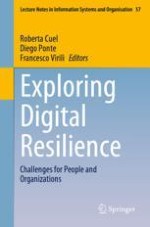This book explores multidimensional issues concerning digital resilience and analyzes how people and organizations maintain, enhance and protect value stemming from digital technologies. Society is now heading for a future in which organizations and people will increasingly depend on digital technologies, yet to date many are still unaware of the scale and risks associated with the digital transformation. As a result, there is an urgent need for digital resilience to drive a fundamental shift in the way people and organizations understand digital technologies, risks and opportunities.
The book gathers a selection of the best papers presented at the annual conference of the Italian chapter of AIS, which took place in Trento, Italy, in October 2021. The diverse range of views put forward by the authors makes it particularly relevant for scholars and practitioners interested in organization, and for all of us living in the digital transformation era.
